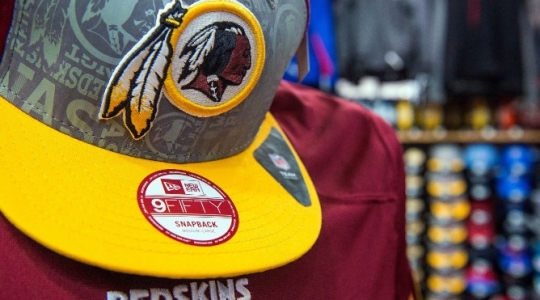A new Washington Post poll showing that 9 in 10 Native Americans are not offended by the Redskins name is likely to be cited by the football team in its dogged quest to preserve its federal trademark protections.
But the poll may not make much impact on the long-running legal showdown between the team and Native American activists because it measures opinions that fall outside the period of time that the courts are supposed to consider.
For nearly a quarter-century, the two sides have tangled over whether the Redskins name violates the 1946 Lanham Act, which bars federal trademark registrations that “may disparage persons, living or dead, institutions, beliefs, or national symbols, or bring them into contempt, or disrepute.”
The courts have focused on two things: whether Native Americans felt disparaged by the name between 1967 and 1990, when the Redskins obtained its six federal trademark registrations, and whether the Lanham Act violates the team’s First Amendment rights.
Amanda Blackhorse, who says the Redskins name disparages Native Americans, stands against a dramatic backdrop at Monument Valley Navajo Tribal Park near the Arizona-Utah border. (Patrick Breen/Arizona Republic)
The activists argue that the name has been a dictionary-defined slur as far back as 1898 and point to protests that date from the 1970s. The team argues that the name has always been intended to honor Native Americans and often cited a 2004 poll by the Annenberg Public Policy Center that found 9 in 10 Indians did not find the name offensive — the same result as the new Post survey.
Last year, a federal judge ordered the cancellation of the team’s trademark registrations, agreeing with a ruling by the federal Trademark Trial and Appeal Board that the team’s name was offensive to Native Americans between 1967 and 1990 and therefore ineligible for protection under the Lanham Act.
The team is appealing that decision to the U.S. Court of Appeals for the 4th Circuit in Richmond. It also has asked the U.S. Supreme Court to consider its arguments if the justices take up a separate case being pursued by an Asian American rock band called the Slants.
Amanda Blackhorse, 34, the lead plaintiff in the group of Native Americans asking the government to revoke the team’s trademark registrations, denounced The Post poll.
“The act of polling a human rights issue is absurd. It trivializes the reports and experiences of those native people who’ve been hurt and damaged by native stereotypes and by the Washington team name,” Blackhorse said Thursday. “There’s no validity to this poll.”
Jesse Witten, the lead attorney with Drinker Biddle & Reath who has been representing the Native American activists pro bono, echoed those sentiments in a brief statement.
“Native American organizations and Indian nations consistently express objection to ‘redskin’ as a slur, just as dictionaries define the term as a slur,” Witten said.
Lisa Blatt, an attorney with Arnold & Porter who represents the team in the case, declined to comment.
Legal experts said nothing can stop the team from citing The Post poll in its pending briefs before the Supreme Court or Richmond appeals court. But judges would be hard-pressed to consider the new evidence because the case is no longer at the trial level. Even if the case was still before the U.S. District Court in Alexandria — or was sent back for review — the Native American activists could still object because the data comes more than 25 years after the team obtained its last trademark registration.
“First, Washington’s NFL team will be stuck with the record they made, and this new survey is not part of that record. I can’t think of a reason why an appellate court would make an exception here,” said Stephen A. Weisbrod, an attorney in the District who has been following the team’s trademark battle. “Second, I am not sure a court would have considered it relevant even if it had been submitted as evidence because it falls outside the time frame at issue in trial.”
Floyd Abrams, a First Amendment attorney who has filed an amicus brief supporting the team’s position, said the Redskins’ legal team can highlight the new poll in briefs or oral arguments on the Lanham Act’s constitutionality and the “danger” of allowing the government decide which words may disparage certain people.
“The poll is sort of an exclamation point to the Redskins’ side of the case,” said Abrams, who filed an amicus brief in the case supporting the team. “It could lead judges to say, ‘What’s going on here? How can the government assert this power given to it by Congress to [decide] on the disparaging or non-disparaging meaning of this language, especially in a case in which many people — who one would think are most offended — don’t really seem so offended at all?”
Source: washingtonpost.com











